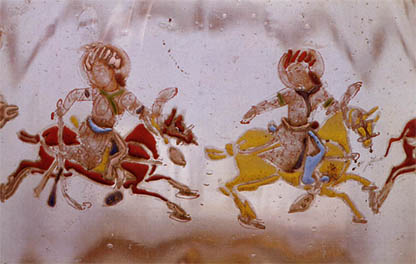
Rasulid polo players, ca. 1260-1270; Museum für Islamische Kunst, Berlin
This week I am participating in a conference in Vienna and will deliver a paper on Rasulid bureaucracy. Details on the conference are noted below. Anyone in or near Vienna is welcome to attend.
In addressing the theme of ‘Land and Power’ we wish to examine the power base of office-holding élites in pre-modern societies. As a tool of analysis we frame our questions in Weberian terms, distinguishing between exercise of power in a bureaucratic mode (ex officio) and power based on economic wealth and privilege in a patrimonial setting, with office being conferred as a consequence. Our focus will be on the interplay between economic power and bureaucratic rationality. In most pre-industrial societies, power and wealth was based on landownership and the control of food production: landownership as the basis of power of an office-holding élite is a recurring phenomenon in ancient states. We also seek to question whether such élites (especially in the periphery) were a force for cohesion or disruption from the point of view of the state, and to investigate the means by which the state sought to integrate and control office-holding élites, e.g. by the use of parallel and/or overlapping chains of command, or by co-optation through court offices and privileges.
Programme (provisional)
Wednesday, 20 February 2013
9–9.30 a.m. Welcome address by Jursa, Michael and Palme, Bernhard (Vienna)
Section 1: Elite Formation
Chair: Jursa, Michael
9.30–10 a.m. Garfinkle, Steven J. (Washington): Landownership and Office-Holding: Pathways to Privilege and Authority under the Third Dynasty of Ur
10–10.30 a.m. Kaiser, Anna (Vienna): Flavius Athanasius, dux et Augustalis Thebaidis
10.30–11 a.m. coffee break
11–11.30 a.m. Scheuble-Reiter, Sandra (Chemnitz): Military Service and the Allotment of Land in Ptolemaic Egypt
11.30–12 a.m. Paulus, Susanne (Münster): The System of Landownership in the Middle Babylonian Time (1500–1000 BC)
12 a.m.–2 p.m. lunch break
Section 2: Feudalisms
Chair: Baker, Heather
2–2.30 p.m. Sarris, Peter (Cambridge): Land and Power in Byzantium c. 700–1000
2.30–3 p.m. Moreno GarcÃa, Juan Carlos (Paris): Land, Elites and Officialdom in Pharaonic Egypt: Land Tenure Strategies in Elite Building and State Reproduction
3–3.30 p.m. Mazza, Roberta (Manchester): Land and Power in Late Antiquity: The Egyptian Point of View
3.30–4 p.m. coffee break
4–4.30 p.m. Reculeau, Hervé (Paris): Patrimonial and Official Land-Tenure in 2nd Millennium Upper Mesopotamia
4.30–5 p.m. Tost, Sven (Vienna): The riparii domorum gloriosarum: Police Power and Large-Scale Landholding in Late Antique Egypt
5–5.30 p.m. Selz, Gebhard (Vienna): Land, Property and Rights of Disposal: A Glimpse at Mesopotamian Sources of the 3rd Millennium
Keynote address:
6.30–8 p.m. Morony, Michael (Los Angeles): Issues and Opportunities in the Study of Land and Power
Thursday, 21 February 2013
Section 3: Centre and Periphery I
Chair: Tost, Sven
9.30–10 a.m. Waerzeggers, Caroline (Leiden): The Persian State in Babylonia: Integration and Control of Office-Holding Élites
10–10.30 a.m. Malczycki, W. Matt (Auburn): Caliphal Policy and the Baladiyyūn of Ifriqiya 757–800 CE
10.30–11 a.m. coffee break
11–11.30 a.m. Pirngruber, Reinhard (Vienna): Land and Power in Late Achaemenid Babylonia
11.30–12 a.m. Palme, Bernhard (Vienna): From City Council to Senate: Landlords from Late Antique Egypt Becoming Imperial Aristocrats
12 a.m.–2 p.m. lunch break
Section 4: Control and Taxation of the Country and its People
Chair: Procházka, Stephan
2–2.30 p.m. Varisco, Daniel Martin (Hempstead): Why the Sultan is Rich: A Case Study of Bureaucracy in Rasulid Yemen (13th–14th centuries)
2.30–3 p.m. Kehoe, Dennis (New Orleans): Urbanization, Land, and Political Control in the Roman Empire
3–3.30 p.m. Frantz-Murphy, Gladys (Denver): Environment and History in the Early Islamic Middle East
3.30–4 p.m. coffee break
4–4.30 p.m. Manning, Joseph (New Haven): Patrimonial Power, State Power, and Land in Greco-Roman Egypt
4.30–5 p.m. Heidemann, Stefan (Hamburg): The Seljuq Form of Government in Northern Syria and Northern Mesopotamia
Friday, 22 February 2013
Section 5: Centre and Periphery II
Chair: Palme, Bernhard
9.30–10 a.m. Mathisen, Ralph (Urbana): The Settlement of Barbarians in the Late Roman World: Barbarians Who Got Something
10–10.30 a.m. Baker, Heather (Vienna): Land and Power in the Neo-Assyrian Empire
10.30–11 a.m. coffee break
11–11.30 a.m. Bsees, Ursula (Vienna): The Partition of Land and Power at the Periphery: Some Notes on the Agreements between St Catherine’s Monastery and Surrounding Bedouin
Conclusion
11.30 a.m.–13.00 p.m. Résumé by Keenan, James (Chicago) and general discussion